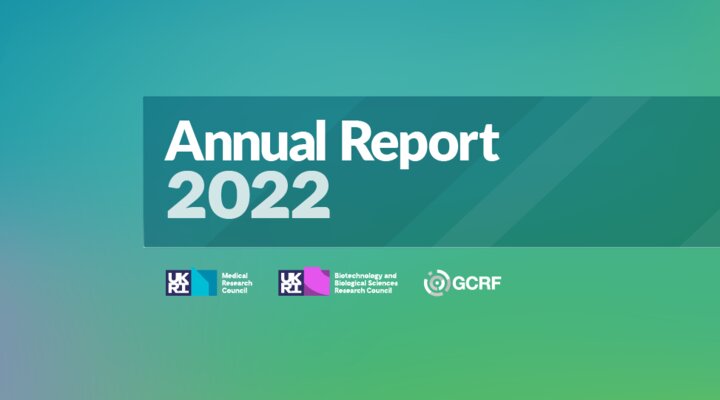Fellowship programme
First cohort of IVVN fellows share their achievements and reflect on the programme's impact at a special online event
The Fellowship programme was developed to address the underrepresentation of women in agricultural science in low- and middle-income countries. As the first cohort of award recipients complete their projects, they presented and discussed their achievements at an online dissemination event.
Members of the International Veterinary Vaccinology Network (IVVN) have come together to celebrate the work of the first cohort of IVVN fellows. At a special online event, members joined the six fellows to hear about the work they have been doing and the impact the Fellowships have had on their career development. The session was moderated by Dr Timothy Connelley, Director of the IVVN, and Wendy Manchur, Senior Program Specialist at the International Development Research Centre (IDRC), which co-funded the programme.
Women continue to be underrepresented in agricultural research and in leadership positions, particularly in low- and middle-income countries (LMICs). Data from the International Food Policy Research Institute shows that women account for only 27% of researchers in LMICs. Even fewer women are represented at senior levels, with many leaving science soon after completing their PhDs.
The Fellowship programme, which launched in 2020, is designed to support the careers of women postdoctoral researchers from LMICs. The programme provides fellows with the support of a local and international mentor, along with the funding required to complete a short research project. Through regular meetings, the mentors offer support and advice, helping the fellows with their projects and future career development.
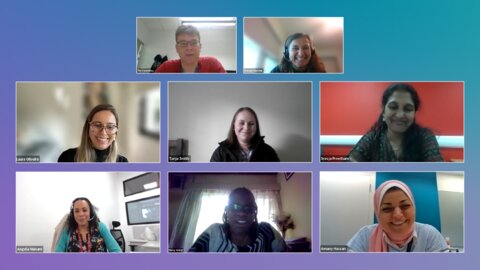
The first cohort of six IVVN fellows was announced in 2021, with researchers from Brazil, Egypt, India, Kenya and South Africa awarded funding:
- Dr Mercy Yvonne Akinyi, Institute of Primate Research, Kenya.
- Dr Amany Hassan, Alexandria University, Egypt.
- Dr Sreeja Preetham, Kerala University of Fisheries and Ocean Studies, India.
- Dr Angela Makumi, International Livestock Research Institute, Kenya.
- Dr Laura Oliveira, Federal University of Rio de Janeiro, Brazil.
- Dr Tanja Smith, Council for Scientific and Industrial Research, South Africa.
At the dissemination event, the fellows each gave a presentation about the work they had achieved during their project, followed by questions from the online audience. After the presentations, there was an opportunity to reflect more generally on the impact of the programme, and the challenges and opportunities for women in science.
Several of the fellows said they had benefited from learning new skills in genomics and bioinformatics through their Fellowships. Dr Laura Oliveira said:
“For me, the opportunities for acquiring research skills that I didn't have at the beginning of the Fellowship was very important, because it helped me fill some gaps of knowledge that we had in our lab and helped me to analyse the genomic data and acquire this expertise.”
Dr Sreeja Lakshmi praised the guidance she had received from her mentors, especially her international mentor, Dr Kim Thompson, who she said had been extremely supportive in dealing with the disruption caused by Covid-19. She said:
“She is such a wonderful person. I always say in every fellow meeting that she has a solution for everything.”
The fellows also benefited from the interaction with other members of their cohort and hearing what they were working on. Dr Angela Makumi said she had particularly benefited from her interactions with Dr Tanja Smith who had provided useful tips and contacts to help secure the necessary antibodies for her work.
Speaking at the session, the IVVN's Director, Dr Timothy Connelley, congratulated the fellows on their phenomenal work and achievements. He said:
“Congratulations to you all, and it's nice to see so many of you lay out very clearly what you've achieved, what it's meant to you, and how you've gained so much from the Fellowship opportunity.”
IDRC's Wendy Manchur also congratulated the fellows and hoped they would continute to help support each other as alumni of the programme. She said:
“We've learned from many of the fellowships we've funded the value of building up the cohort and having mentors who were formerly fellows to help support other women fellows. So congratulations to all of you and it's been a delight to hear about all the advances and challenges that you've overcome.
Recording of the event
You can also watch and share the recording on Vimeo or follow along with the session chat in Zoom.
Summary of the presentations

Dr Mercy Akinyi spoke first about her project on coronavirus surveillance in understudied non-human primates. Mercy's work involved molecular and serology screening for coronaviruses and virus susceptibility in wild primates. The project also allowed capacity building at the organisation in Kenya where Mercy works, the Institute for Primate Research, with the purchase of a MinION sequencer and training for Mercy on how to use it. Mercy was mentored locally by Dr Lucy Ochola and internationally by Professor George Warimwe from the University of Oxford and the KEMRI-Wellcome Trust Research Programme.
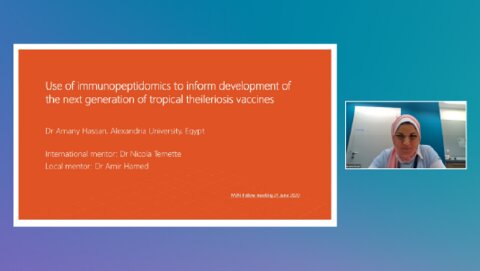
The second speaker, Dr Amany Hassan, used her Fellowship to study the tick-transmitted cattle parasite Theileria annulata, using immunopeptidomics to help inform vaccine development. This work involved isolation and identification of the peptides involved in the cellular response to the pathogen, which benefited from the mass spectrometry expertise of Amany's international mentor, Dr Nicola Ternette at the University of Oxford. Amany was also mentored by Dr Amir Hamed at her host institute, Alexandria University in Egypt.

Next, Dr Sreeja Lakshmi from the Kerala University of Fisheries and Ocean Studies, India, presented her work on the development and testing of a nanoparticle vaccine against Aeromonas hydrophila for use in Indian tilapia aquaculture. Working with her local mentor, Dr Elumalai Preetham, and international mentors, Dr Kim Thompson and Dr David Smith at the Moredun Research Institute in Scotland, Sreeja showed that her cobalt nanoparticle vaccine candidate elicited an enhanced immune response in vaccinated fish.
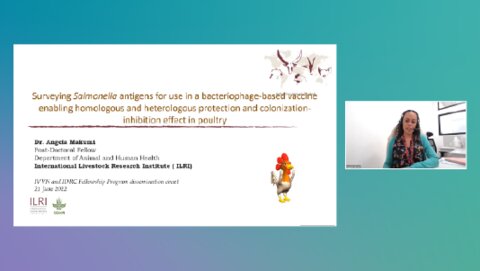
The next Fellow to present was Dr Angela Makumi, whose project involved surveying Salmonella antigens for use in a bacteriophage-based poultry vaccine that targets locally relevant Salmonella enterica strains. Angela's work showed that, based on the screening method used, oral innoculation with different strains of Salmonella did not elicit antibodies and that some vaccine types do not elicit an antibody response in the indigenous chickens used in the study. Angela was mentored by Dr Nicholas Svitek at her home institute, the International Livestock Research Institute in Kenya, and by Dr Andrea McWhorter at the University of Adelaide, Australia, and she is currently writing additional grant proposals to develop this work further.
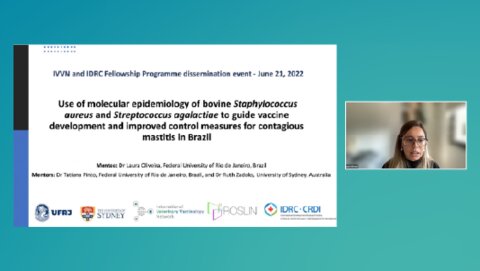
Up next was Dr Laura Oliveira, who worked on contagious bovine mastitis vaccine development. This infectious bacterial disease causes great economic losses to Brazil's dairy industry. Laura's project has led to the establishment of an extensive research network in Brazil that will improve collaboration and resource sharing. Her results on the bacterial lineages circulating in Brazil will allow better control practices and identified vaccine targets for future investigation. Laura's mentors were Dr Tatiana Pinto at the Federal University of Rio de Janeiro, Brazil, and Professor Ruth Zadoks at the University of Sydney, Australia.
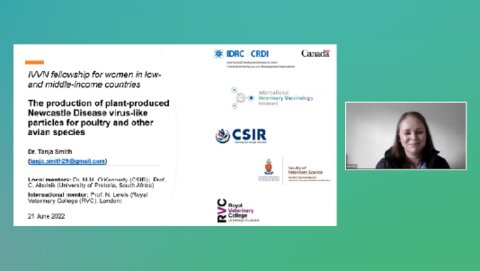
The final speaker was Dr Tanja Smith from the Council for Scientific and Industrial Research in South Africa. Tanja's project focused on producing Newcastle disease virus like particles using plants. Newcastle disease is a poultry disease that poses a significant risk to global food security. The project has led to the successful establishment of an effective plant production platform and the virus-like particles produced are immunogenic in chickens when used with a commercial adjuvant. Tanja's local mentors in South Africa were Dr Martha O'Kennedy and Professor Celia Abolnik, while Professor Nicola Lewis from the UK's Royal Veterinary College served as international mentor.
